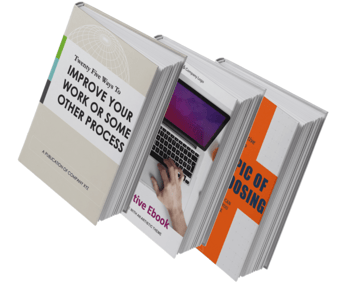The 2 Best Ebook Formats for Marketers [Free Templates]
Some argue that in the world of marketing, ebooks are dead. Others say they are not. But the fact is that ebooks — when written, designed, and marketed properly — can generate thousands upon thousands of contact submissions for your business.
Whether you're just getting started with ebook creation as a marketing tool, or you're reconsidering the role of ebooks in your existing content strategy, you're likely asking yourself an important question: What is the best ebook format for the ebooks in my marketing library?
It's important to note that this question can be answered in two different ways:
- What is the best ebook format for content creation?
- What is the best ebook format for content consumption?
Here, we'll cover best practices for both of these topics — and explain how HubSpot's Ebook Templates can help you achieve your marketing team's lead generation goals.
Featured Resource: 18 Free Ebook Formatting & Creation Templates

Download Free Ebook Templates
Need help formatting your ebooks? Our collection of 18 free ebook templates will help you create and format your ebook content for an incredible reader experience in Microsoft PowerPoint, Adobe InDesign, and Google Slides so that you can format your ebooks in the way that best suits your marketing team and your content readers.
The 3 Best Ebook Formats for Content Creation
1. Adobe InDesign
Adobe's advanced design software gives content creators a myriad of options for creating and formatting their ebooks.
These advanced features do come at a price, but experienced marketing designers rely on Adobe InDesign because of those features.
Click Here to Download 6 Adobe InDesign Ebook Templates.
Pros:
Adobe is known for being feature-rich. As a result, you can expect your ebooks to look their best when made with InDesign, as you'll be able to create and incorporate original design elements right in your document.
Cons:
For an inexperienced designer or for the marketer who just needs to get a serviceable offer released, the bells and whistles that InDesign offers might not be necessary. InDesign's interface and usability aren't the most straightforward, and could require you to put in more effort than is needed for your final deliverable.
2. Google Slides
Google Slides is a simpler tool for making an ebook when compared to InDesign, and the fact that documents live online mean you can collaborate in real-time with your team members to make a fantastic deliverable. Oh — and it's free, which is helpful if you have a limited marketing budget.
Click Here to Download 6 Google Slides Ebook Templates.
Pros:
Google Slides is a great tool for marketers who need to make a good ebook quickly — especially if you're working alongside team members and are sourcing feedback from them. The interface of Slides is arguably more straightforward than InDesign's, meaning you can move and edit creative elements faster if you're new to both tools.
Cons:
Because Google Slides is primarily a presentation tool rather than an ebook creation tool, you may miss out on some necessary features that would help make your ebooks the quality they need to be in order to warrant your leads' attention.
Conversely, you might need to make design elements elsewhere, such as an Adobe software or Canva, and later import these creative elements into your Slides deck. This could create an inconsistent creation experience if you need to track down design elements after you've created them.
Comments
Post a Comment